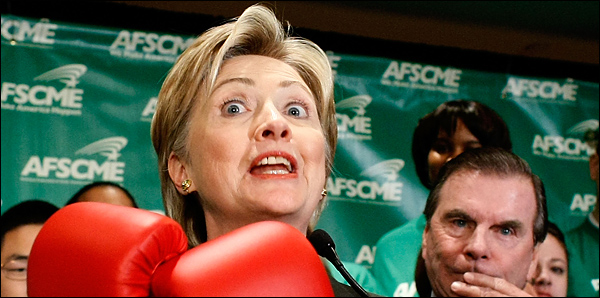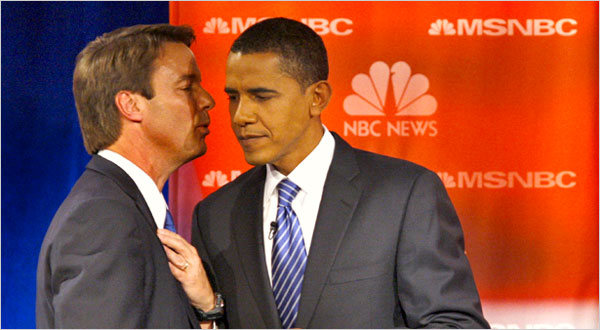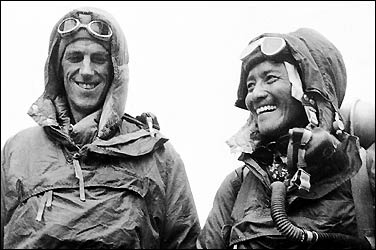
An Early Round Knockout…

…or a new Democratic Frontrunner?
Barring a split decision of some kind, we should have our first real sense of how Election 2008 will all shake out by late this evening. Obviously, it seems somewhat bizarre to choose our two presidential candidates — a full eleven months before Election Day — solely by who can best navigate the byzantine complexities of the Iowa caucus system. But the cycle being as accelerated as it is, and with money, name recognition, and the post-Iowa press bounce playing the roles that they do, it’s hard to see any other Democratic candidate gaining enough traction between now and Super Duper Tuesday (February 5) to stop Senator Clinton should she win tonight. And — given her high negatives — it’s almost as hard to envision how Clinton might be able to come back should she definitively lose Iowa and New Hampshire to Obama or Edwards. So, with that mind, it’s seems like the last, best time to write up an primary endorsement. Now, as long-time readers might remember, I threw myself behind Bill Bradley in 2000 and tepidly endorsed Howard Dean in 2004, so the track record around here isn’t too good. But, hope springs eternal, so regarding 2008…
THE REST OF THE FIELD:
Even if it is a bit unfair, the fact that no other candidate besides the top three is breaking the 15% viability threshold in the polls helps facilitate clumping them together like this. Still, in a perfect world, CHRIS DODD in particular would merit a closer look from voters. An experienced Senate progressive who’s stressed the importance of universal service, Dodd would likely make a fine president. But, for whatever reason, Dodd never established the media presence to be a true contender in 2008, and he goes down as the top of the second tier.
Senator JOE BIDEN has run a much better campaign than I ever expected, particularly given his dismal performance during the Alito hearings and his “clean and articulate” flub out of the gate. Indeed, Biden has shown a nuanced understanding of global issues and an impressive command over the foreign policy domain, and he has distinguished himself in debates with wit and (surprisingly enough) brevity. If he is inclined to take the job, I expect he’d make a fine Secretary of State in the next Democratic administration (although he may face some competition from the likes of Richard Holbrooke, particularly if Clinton wins the nomination.)
His considerable record notwithstanding, BILL RICHARDSON has never made a positive impression on me this election cycle. He has scowled his way through debates (when he wasn’t capitulating to Clinton), he’s shown himself to be a practitioner of the Dubya Fratboy school of leadership (nicknames, backslapping, etc.), and I’ve yet to hear anything from him that seems even remotely inspiring. In a way, he’s been the Fred Thompson of the Democratic side — the theoretical Dark Horse candidate who’s been a total non-starter. At any rate, the fact that the New Mexico Governor can’t even break the top three in nearby Nevada suggests his presidential bid isn’t long for this world. (For what it’s worth, he’s apparently asked his supporters to back Obama in the caucuses.)
As in the 2004 cycle, DENNIS KUCINICH has been a breath of fresh air on stage — he’s the one (semi-viable) candidate who unabashedly refuses to join his colleagues in the protective camouflage of GOP-lite centrism. (This is no small feat given how reflexive this knee-jerk “triangulating” tendency has become among Dems in recent years.) Still, even he recognizes that Iowa will not be kind to him, and has also asked his supporters to vote Obama. So, (MIKE GRAVEL notwithstanding, I suppose, although, despite his impressive record of service, he never seemed much more than a novelty act), that leaves the Big Three:
HILLARY CLINTON:
Senator Clinton is a smart, tough, and formidable leader, and although the presidential merits of her experience as First Lady has lately been called more into question, no one can deny that she’s a battle-tested veteran of the partisan wars of the 1990s, or that she’s the candidate most accustomed to the vicissitudes of the GOP attack machine. She’d make a very good president, particularly compared to George W. Bush and any Republican running.
Still, I’ve already described my major concerns about Clinton’s candidacy here, here, and particularly here, so if you’ll permit me to quote from that last entry, my issues are thus: “[1] She’s thoroughly lousy on campaign finance reform, to my mind the issue that bears on virtually all others; [2] she apparently didn’t have the wherewithal or leadership instincts to realize the Iraq war was a terrible idea in 2003 (it didn’t take all that much to figure it out, particularly when you figure how much more information Clinton had access to than we did); [3] her view of centrism is apparently to act like Joe Lieberman every so often; and [4] most of the nation has already decided for various reasons that they don’t like her.” Once you factor in her unseemly corporate backers, her woeful view of human rights versus national security, her recent campaign missteps and tribulations, and the dynasty issue to that list, I find it hard to get very enthused about Senator Clinton’s candidacy.
If 2004 taught us anything, it’s that the electability issue is a bit of a canard. We picked John Kerry because we believed he was more “electable” than Howard Dean, and that may have even been true. But can anyone name a single state that Kerry won in the general election that Dean wouldn’t also have carried? All that being said, given her very strong negatives, I do think Senator Clinton is not only the least “electable” of the Big Three, but the only candidate — in either party — who could manage to reunite the fractured GOP this cycle. It may not be her fault, but she will invariably bring out the wingnuts in force to vote against her. I’d even go so far as to say that the GOP is banking on Hillary Clinton as the Democratic nominee. It’s the best possible outcome for them, and they know it.
And given that the leadership Clinton offers is the same unambitious and uninspiring blend of triangulated-to-death DLC centrism practiced by her husband, why even take the chance? This is not to say Bill Clinton was a bad president, not at all. Given the times he was working in and the low-down, unprincipled miscreants he was often forced to contend with, you could even say he accomplished amazing things, once he got his sea legs. Still, we are now at a moment when the Republican party is in rout. The conservative movement which began in 1964, coalesced during the 70’s and 80’s, and gave us the likes of Reagan, Gingrich, and Bush has now — at long last — been thoroughly discredited. Our nation has paid a heavy price for this realization, in both blood and treasure. Now more than ever, it is time for Democrats to shake off the protective camouflage and step into the sunlight. Put simply, it is time for change.
JOHN EDWARDS:
John Edwards is a candidate I’ve always thought highly of and, indeed, I voted for him in the NY primary in 2004. While he got off to a shaky start this cycle, Edwards — arguably the candidate with the most to win or lose today — has improved considerably over the past few months. In fact, I probably agreed with him more than any other candidate onstage in most of the debates. He was often the only person to suggest that the current system is fundamentally broken, and that stronger lobbying and campaign finance laws are needed to cleanse the taint of money from our political process and to make it responsive again to the needs and aspirations of everyday voters. As I said in the two long posts on progressivism several weeks ago, I agree — as many progressives did a century ago — that the unchecked influence of vast sums of money in Washington is arguably the central political problem facing our republic. Countless terrible decisions made by this administration, and by their Democratic counterparts in Congress, flow directly from the sad fact that dollars speak louder than people. And all the 12-point policy proposals in the world on health care, taxes, education, whathaveyou, won’t change a thing until this underlying problem is recognized and rectified. To my mind, Edwards should be applauded for ringing the alarm bell loudly and strongly. (Not for nothing has Ralph Nader endorsed him.) If this argument carries Edwards all the way to the presidency, the result would almost assuredly be good for the country.
That being said, if I were caucusing in Iowa today, I would not be voting for John Edwards. Not because of any fault of Edwards — he’s my strong second choice — but rather because I think there is one other candidate out there who shows more progressive potential. More on him in a moment, but, before I switch topics, here’s the rub. As much as I admire Edwards for articulating the problem before us, I don’t actually agree all that much with his solution to that problem. Put simply, Edwards is sounding the chord of populism, and populism is not progressivism. Populism speaks in a language of class, of insiders and outsiders, of haves and have-nots. Populism is often characterized by free-floating anger towards an elite “insider” cadre of some sort, and, while it’s reductionist to group everyone together like this, populism has worked as well for Tom Watson and Huey Long as it has for Joe McCarthy and Ronald Reagan. It’s a blunt instrument that despises elites of any kind and relies on and perpetuates an us-versus-them mentality among Americans. From everything I’ve seen of him in the debates and otherwise, John Edwards isn’t really using the inclusive language of progressive citizenship to make his case. He’s wielding the often divisive cudgel of populism. Now, if I have to pick a side, I’m obviously with the people against the oligarchs. And if this is the only way America will wake up and recognize the stench of legalized corruption, so be it. But I still think this nation will embrace civic progressivism along the lines I recently discussed, given the right leadership…
BARACK OBAMA:
If Edwards has been articulating the key progressive problem — corruption in government — then Barack Obama embodies the key progressive solution. Like no other candidate we’ve seen on the Left in nearly a half-century, Obama has the potential to restore Americans’ faith in government and bring people back into the political process. Many skeptics among the punditry have derided Obama as a “hopemonger,” but, to my mind, his optimistic appeal shouldn’t be taken lightly. In a country where less than half of us vote anymore, anything that encourages people who have felt disenfranchised to look anew at or become enthused about our common citizenship is a godsend. In short, Obama — young, thoughtful, intelligent, charismatic — seems the only candidate with the potential to spark a true progressive revival. True, Obama isn’t quite speaking the language of progressivism yet. But he’s been veering closer to it than either Clinton or Edwards (Note, for example, the line quoted in his stump speech at the link above: “Americans all across the country are hungry for — desperate for — a new type of politics. Something different. A politics focused not on what divides us but on our common values and our common ideals.” This argument that we are one people, all in it together and bound together as citizens by our commonalities, is the very warp and woof of civic progressivism.)
What goes for the nation goes for the globe. As Andrew Sullivan noted in his endorsement of Obama back in November, an Obama presidency single-handedly “rebrands” the United States in the eyes of the world. No other candidate running suggests so immediately and profoundly that we live by the democratic ideals we espouse, that we are a nation of diversity committed to individual flourishing, and that America is a land where anyone and everyone has the opportunity to rise to their full potential.
This holds true for our enemies as much as our friends (many of whom will be glad to see anyone but Dubya in the Oval Office.) As Sullivan put it, “Consider this hypothetical. It’s November 2008. A young Pakistani Muslim is watching television and sees that this man — Barack Hussein Obama — is the new face of America. In one simple image, America’s soft power has been ratcheted up not a notch, but a logarithm. A brown-skinned man whose father was an African, who grew up in Indonesia and Hawaii, who attended a majority-Muslim school as a boy, is now the alleged enemy. If you wanted the crudest but most effective weapon against the demonization of America that fuels Islamist ideology, Obama’s face gets close. It proves them wrong about what America is in ways no words can.“
Progressive potential and global symbolism aside, Obama has shown himself to possess the requisite talents needed to make an excellent president. As we all know, he was the only major candidate with the judgment to speak out against the Iraq War from the start. In debates, he’s proven himself light on his feet and displayed a quick, voracious mind. (As Slate‘s Michael Kinsley put it, “When I hear him discussing some issue, I hear intelligence and reflection and almost a joy in thinking it through.“) During his tenure in the Senate, he’s shown a pronounced ability to work with people across the aisle, and counts among his friends and working partners such paleolithic conservatives as Sam Brownback and Tom Coburn. His Dreams from My Father testifies to a life of travel and experience that would serve him well in the Oval Office. And, unlike Senator Clinton, Obama has been a friend to campaign finance and lobbying reform, which remains crucial to any real change happening in the next four-to-eight years.
Now, obviously there are some lacunae surrounding Obama. He is a young man, and relatively new to national politics. He has admittedly been vague at times, and could have done considerably more these past few months, when given the nation’s ear, to highlight the issues he finds important. There’s a possibility — maybe even a strong possibility — that he’ll end up a Tommy Carcetti-like president: a well-meaning reformer outmatched and buffeted to and fro by the entrenched forces arrayed against him. After nearly eight years of Dubya, Washington is pretty screwed up these days, and I’m not naive enough to think any one politician can undo all the damage that’s been wrought in recent years. Still, given the Democratic field, my money’s on Barack Obama. He has the potential to be a very special candidate — the kind that comes around only once or twice a generation — and I hope this evening sees the first of many successes for his campaign.
GitM votes Obama.



